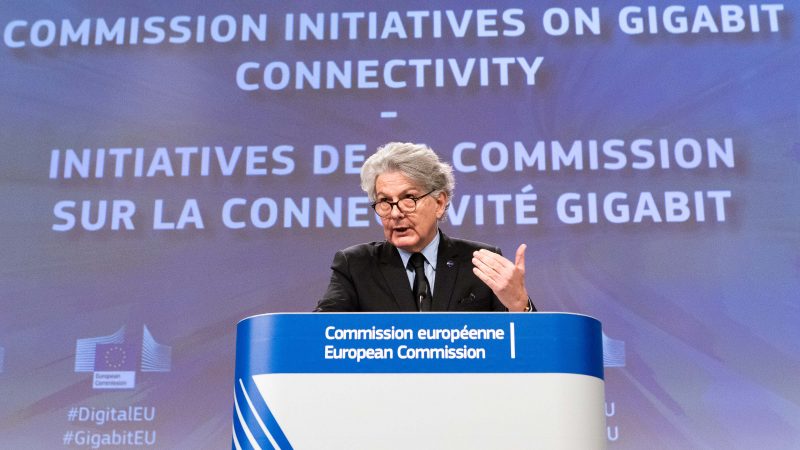The European Commission presented on Thursday (23 February) a “connectivity” package including measures to stimulate the deployment of high-capacity networks in Europe as well as a public consultation which could pave the way for large technology companies to participate in the costs. infrastructure.
Thierry Breton, European Commissioner in charge of the Internal Market, presented this series of long-awaited initiatives, the most controversial part of which is a questionnaire intended to feed the so-called “ fair contribution ” initiative, according to which the biggest generators of traffic would contribute to IT infrastructure costs.
“Broadband Internet requires significant investment. This is why, in addition to facilitating the deployment of the network in the short term, we are studying the essential question of who should pay for the next generation of connectivity infrastructure,” said Mr. Breton.
The package also includes the Gigabit Infrastructure Regulation, a draft regulation intended to accelerate the deployment of fiber optics and 5G nationwide. It also includes a Gigabit Recommendation, a non-binding document that may provide useful guidance to national telecommunications regulators.
Fair Contribution
Mr. Breton, former CEO of France Telecom, was the main political driving force behind the “fair contribution” principle.
Based on the “sender-pays” principle, the initiative stems from a long-standing issue raised by telecommunications operators, who lament the fact of having to bear the cost of infrastructure investments while large companies technologies reap most of the benefits.
The initiative was first mentioned last May, arousing strong reactions. EU MPs and governments have spoken out for or against, the body of European regulators has issued a relatively negative opinion and civil society groups have warned against breaches of net neutrality.
The consultation is not fundamentally different from a version leaked three weeks ago. The discussions will last 12 weeks and aim to set out a long-term vision for the future of the telecommunications sector.
A relatively politically sensitive part of the questionnaire concerns the threshold at which a technology company would be considered a “large traffic generator”, a category likely to include companies such as Netflix or even Google.
The other important question concerns the type of solution. The questionnaire presents two options: a digital fund which could be created at European or national level, and a direct contribution to telecommunications operators which could be subject to certain conditions, such as green investments.
Gigabit Infrastructure Regulations
The EU executive presented the Gigabit Infrastructure Regulation, a proposal to revise the directive on cutting broadband costs and speeding up the rollout of 5G and fiber optic networks.
The Commission considers that the previous directive failed to meet its expectations because it gave Member States too much leeway, some of them never fully applying it. This error should be avoided with a regulation, which is a legislative tool directly applicable to national courts.
Yet the Broadband Cost Reduction Directive was also initially proposed as a regulation, before being converted into a directive by European governments.
Asked by EURACTIV why the situation should be different this time around, an EU official said conditions have changed as the EU has set ambitious connectivity targets. Furthermore, some Member States have already gone even further than what was initially required in the Directive.
The overall structure of the proposal has not changed from the version of the proposal that was leaked last month. The central idea is to reduce the administrative burden for the deployment of the network, in particular by simplifying permit procedures and limiting administrative costs.
The procedure for obtaining permits is also digitized through a single information point at national level, which will also include information on planned infrastructure and civil works that telecommunications operators could access under conditions specific.
Network providers could also have access to public infrastructure such as the roofs of public buildings, a provision intended to encourage the deployment of 5G. In addition, new or renovated buildings must be pre-equipped with fiber optics.
Gigabit Recommendation
The third element of the package is a recommendation intended to provide the appropriate incentives to telecommunications providers deploying optical fiber and new conduits.
Although non-binding, the recommendation could prove to be very influential insofar as it can guide the decisions of national telecommunications regulators. This is particularly the case with regard to the application of the European Electronic Communications Code, which constitutes the EU regulatory framework for the telecommunications sector.
The Commission’s interpretation of the Code could be particularly influential since national regulators must inform the European executive of certain decisions, such as price flexibility, or the practice of renegotiating prices between two telecommunications operators when the conditions of the market change.
The recommendation expands the possibility for national regulators to take price flexibility into account. For alternative operators, with this measure, the recommendation mainly benefits incumbent operators, i.e. the former national monopolies which own most of the infrastructure.
Luc Hindryckx, executive director of the European Association for the Defense of Competition in the Telecommunications Sector, spoke out against this recommendation. According to him, “ if approved, it will put an end to 25 years of successful liberalisation, the European model based on inclusion and will fuel inflation at the most critical moment that the European economy is going through”.
Another disputed measure concerns the possibility for telecommunications regulators to authorize operators to raise access costs when they announce the transition from copper networks to optical fiber.
This article is originally published on euractiv.fr









